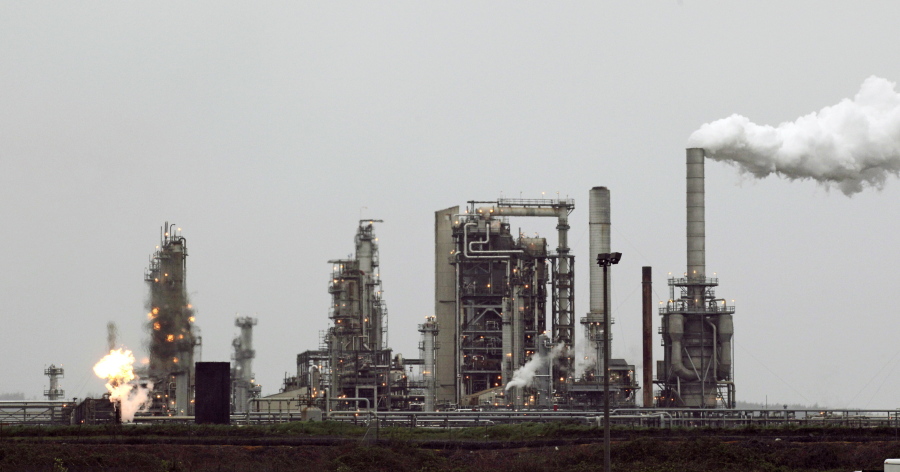SEATTLE — Washington’s five Puget Sound refineries in 2021 imported $700 million of Russian crude oil, equal to just under 5% of their annual processing capacity, according to an analysis of federal import information by the Seattle-based Sightline Institute.
In the aftermath of Russia President Vladimir Putin’s decision to invade Ukraine, the country’s oil industry has come under greatly increased scrutiny. Some opponents of the war, including a bipartisan group of lawmakers in Congress, have called for bans on imports. U.S. Secretary of State Antony Blinken, speaking Sunday on CNN’s State of the Union, said that such a measure is in “very active discussion as we speak” with European allies.
The five refineries largely process North American crude from Alaska, Canada and the Bakken Formation of North Dakota.
The amount they import from Russia has varied from year to year, according to Sightline Institute’s analysis of federal Energy Information Administration data. From 2009-2021, the refineries imported a total of about 2.1% of their total supplies from Russia, according to the Sightline analysis of federal records.
During time-frame, Marathon Oil’s Tesoro refinery at Anacortes has been the biggest Russian importer. Overall, that refinery received nearly 7% of its crude from Russia, and last year, the refinery’s Russian imports spiked to more than 20% of its total crude refined, according to the Sightline analysis.
“That’s a huge outlier compared to the other four Puget Sound refineries,” said Zane Gustafson, a senior research associate at Sightline.
S&P Global, a financial reporting service, noted that this year the refinery imported Russian crude as recently as Feb. 22, which was two-days before Russian troops invaded Ukraine.
Sightline is a policy think tank with a mission of making the Northwest “a global model of sustainability.” Gustafson said that the “fact that our region, depends, even slightly, on Russian oil only adds to the urgency of getting off fossil fuels.”
Marathon Oil on Monday did not respond to emails seeking comment about Russian imports and the company’s policy toward these oil imports. It’s refining capacity represents about 18% of the state’s total refining capacity.
BP, which operates the state’s largest oil refinery at Cherry Point in Whatcom County, imported 1.6% of its oil from Russian during the 2009-2021 period.
This year, BP will only import oil from Russia contracted before the Feb. 24 Ukraine invasion. That includes two tankers with Russian oil scheduled to dock at Cherry Point in the weeks ahead.
BP “will continue to meet existing contractual obligations subject to sanctions, security and shipping requirements and where safe to do so,” said JP Fielder, who heads up BP’s U.S. communications. “We will however not enter into new business with Russian counterparties unless it is essential for ensuring security of supply. We will of course comply with all applicable sanctions and local restrictions.”
Any move in Europe and the United States to cut off Russian oil imports would likely add further momentum to a surge in oil prices in U.S. and international markets that has pumped up the profits of oil companies as consumers pay more for gasoline, diesel and other petroleum products.
Such move also faced considerable opposition in Europe, which is much more heavily dependent on Russian oil than the United States.
But markets are spooked.
Oil prices soared to above $130 per barrel for the benchmark West Texas Intermediate crude futures Sunday night before easing to under $120 on Monday. Gas prices hit a record high in Washington, jumping more than 40% from a year ago, according to the American Automobile Association.
Vermont Sen. Bernie Sanders has called for a windfall profits tax and “reasonable price controls” to prevent what he called “price gouging of consumers,” according to a Sanders’ Tweet on Feb. 26.



